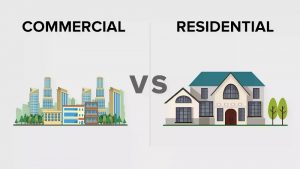Why Commercial Real Estate is a Better Investment than Residential Real Estate
Why commercial instead of residential? Real estate investing can be a fantastic strategy to both grow wealth and earn income that requires no active management on your part. When it comes to investing in real estate, though, there are primarily two categories of properties to choose from: residential and commercial. Although investing in either residential or commercial real estate might result in a return, there are several reasons why investing in commercial real estate is a preferable choice. In this piece, we will discuss the various positive aspects of investing in commercial real estate, as well as the reasons why this is the best option for financial backers.
Higher Income Potential
The possibility of a greater income is one of the most significant benefits associated with investing in commercial real estate. In most cases, the rental revenue generated by commercial assets, such as office buildings, retail spaces, and warehouses, is far more than that generated by residential properties. This is due to the fact that commercial renters are typically enterprises that have particular location or square footage requirements for their operations. These companies are prepared to shell out a hefty sum in exchange for a prominent location, facilities that are kept in good condition, and amenities such as parking and safety measures. Additionally, business leases are often longer than residential leases, which allows landlords to enjoy a more steady and predictable income stream. This is because commercial leases are normally for longer periods of time.

Less Competition
In comparison to residential real estate, there is typically less competition in the market for commercial property, which is another advantage of this type of investment. Because residential properties are frequently in great demand, particularly in desirable neighbourhoods, investors may need to compete with other buyers and face the possibility of bidding wars. This is especially true in situations when the neighbourhood is desired. On the other hand, it could take longer to sell or lease commercial properties, which means that there is less competition and more room for investors to negotiate favourable terms.
Less Hands-On Management
Managing residential properties may be a tough and time-consuming endeavour, particularly if you are responsible for more than one unit or renter. In contrast, commercial buildings frequently call for less active management from the owner. The maintenance of the spaces rented to commercial tenants is normally the responsibility of the tenants themselves; as a result, landlords do not need to be concerned about repairs, maintenance, or cleaning. In addition, commercial leases typically include conditions that require tenants to pay for operating expenditures such as taxes, insurance, and utility bills. This is common practise in the industry.

Longer Lease Terms
As was just discussed, the normal term length for a commercial lease is far longer than that of a residential lease. This allows landlords to enjoy a more consistent and predictable revenue stream, in addition to greater freedom when it comes to making plans for the future. If a tenant decides not to renew their lease at the end of a longer lease period, the landlord has more time to look for new tenants to fill the vacancy in the rental unit.
Diversification
Your investment portfolio may benefit from greater diversification if you include commercial real estate investments among its holdings. Residential real estate is frequently affected by shifts in the housing market, which can be driven by a variety of factors including supply and demand, interest rates, and the general status of the economy. On the other hand, unlike residential real estate, commercial property can offer greater stability and protection from the aforementioned market volatility. Office buildings, for instance, may be less susceptible to the effects of shifts in the housing market due to the fact that businesses are required to keep a physical presence regardless of the state of the economy. For a commercial building construction company see here.
Tax Benefits
There are also potentially considerable tax savings associated with investing in commercial real estate. Landlords of commercial properties are allowed to deduct a wide variety of expenses from their income, including property taxes, insurance, upkeep, and repairs. In addition, commercial landlords have the ability to deduct the property’s depreciation over the course of time, which can provide a sizable advantage when it comes to taxation. Additional tax benefits, including as bonus depreciation and Section 179 deductions, might also be available to commercial landlords who qualify for them.
Conclusion
Although investments in residential and commercial real estate each have the potential to generate profits, commercial real estate is the superior choice for investors due to the many benefits it offers over residential real estate. These benefits include the potential for a higher income, reduced levels of competition and hands-on management, increased levels of diversification, longer lease terms, and considerable tax savings. You will be able to make an educated conclusion about whether or not investing in commercial real estate is the best choice for you if you take these things into consideration and conduct adequate research.
